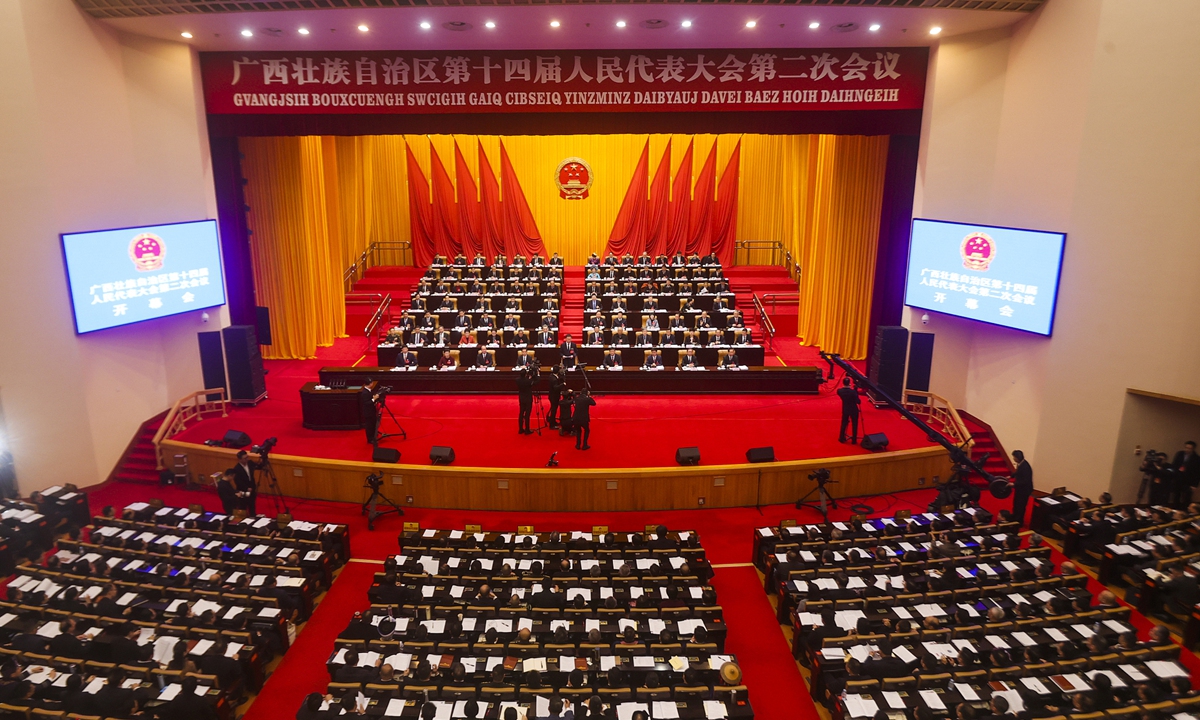Provinces kick off annual two sessions; marriage, childbirth, minor protection among popular proposals

The 2024 local two sessions starts in Nanning, South China's Guangxi Zhuang Autonomous Region on January 22, 2024. Photo: Xinhua
Ahead of the annual national two sessions - National People's Congress (NPC) and the National Committee of Chinese People's Political Consultative Conference (CPPCC) - scheduled in March, provincial-level regions have started their local sessions.
In Shanghai, the second plenary session of the 14th CPPCC Shanghai Committee began on Monday, marking the start of this year's annual two sessions of the city's top legislative body and political advisory body.
During the ceremony, Hu Wenrong, chairman of the committee, delivered a work report which reviewed the major works of the 14th CPPCC Shanghai Committee's Standing Committee in the past year, in fields such as Party building, national strategies, city development, and rural revitalization, and set new tasks for the future work.
The CPPCC Shanghai Committee vowed to make efforts in mega city construction and management, improving the well-being and livelihood of the people, addressing livability and comfortable living for residents, and continuously boosting the ecological and living environment. Twenty-six inspection tours were organized for local CPPCC members and 1,080 proposals were submitted, among which 971 had been handled and completed.
Of the other provincial-level regions, Southwest China's Xizang Autonomous Region was the first region to finish its local sessions. South China's Guangdong Province and Guangxi Zhuang Autonomous Region, East China's Zhejiang Province also kicked off its annual two sessions on Monday.
In the past weekend, Beijing, Chongqing municipalities and North China's Hebei Province have kicked off the sessions, with the scheduled durations at three to five days, while many other provincial regions have fixed their sessions in late January.
During the provincial two sessions, the economic growth targets announced at the current provincial meetings are generally set at no less than 5 percent. Beijing has set its target at around 5 percent, Hebei at around 5.5 percent, Chongqing at 6 percent, and Xizang at around 8 percent.
In addition to the focus on economic growth targets, the Global Times has noticed that this year's provincial two sessions have seen representatives paying more attention to livelihood issues such as marriage, childbirth, and the protection of minors.
According to a proposal from a representative of the Sichuan Provincial People's Congress, she is particularly concerned about support for childbirth. In this regard, she suggests that the government increase support for young couples in terms of childbirth.
Sichuan Provincial People's Congress representative Wen Xueqian, 41, suggests that Sichuan should choose a city to pilot support policies for first-time childbirth among young couples, and then expand it to the whole province when the time is right. She also suggests that the cost of assisted reproductive techniques (such as in vitro fertilization) and the treatment of infertility should be included in the scope of medical insurance and maternity insurance reimbursement according to certain standards.
Wen told the Global Times on Monday that there are negative factors in terms of employment or marriage in society, which is a serious social problem that should be taken into consideration.
Another representative from Shanghai, Zhang Yuxia told the Global Times on Monday that this year she brought eight proposals to the local two sessions, one of which was inspired by "real youngsters" - she was inspired by middle school students while participating in a simulated United Nations conference of students.
Zhang told the Global Times that she has suggested updating and improving laws and regulations, establishing age restrictions for children entering opposite-sex facilities.
For example, Zhang suggested setting an age limit for boys to enter public female restrooms or changing rooms and for girls to enter public male restrooms or changing rooms. At the same time, national standards for gender-neutral spaces in various public places should be established, and public facilities should be improved.
In addition, Zhang also submitted a proposal on the protection of minors, suggesting that in criminal and civil cases involving minors, more social workers should be introduced to play a greater role.
Some provinces are also still collecting public opinions online for the local two sessions. In Sichuan, local netizens have already left over 200 suggestions for the provincial representatives. Among the commenters, the majority are born after 1990, accounting for over 30 percent, according to Sichuan Daily.


